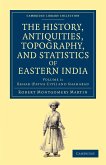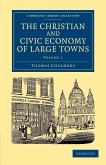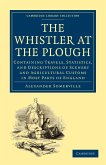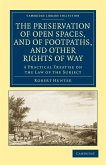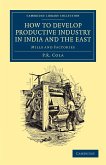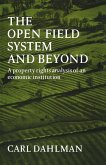Herbert Spencer
First Principles
Herbert Spencer
First Principles
- Broschiertes Buch
- Merkliste
- Auf die Merkliste
- Bewerten Bewerten
- Teilen
- Produkt teilen
- Produkterinnerung
- Produkterinnerung
Herbert Spencer considers the meaning of knowledge and the impulse to diversity that underlies the universe.
Andere Kunden interessierten sich auch für
![Workplace Studies Workplace Studies]() Paul LuffWorkplace Studies47,99 €
Paul LuffWorkplace Studies47,99 €![The History, Antiquities, Topography, and Statistics of Eastern India - Volume 1 The History, Antiquities, Topography, and Statistics of Eastern India - Volume 1]() Robert Montgomery MartinThe History, Antiquities, Topography, and Statistics of Eastern India - Volume 167,99 €
Robert Montgomery MartinThe History, Antiquities, Topography, and Statistics of Eastern India - Volume 167,99 €![The Christian and Civic Economy of Large Towns The Christian and Civic Economy of Large Towns]() Thomas ChalmersThe Christian and Civic Economy of Large Towns42,99 €
Thomas ChalmersThe Christian and Civic Economy of Large Towns42,99 €![The Whistler at the Plough The Whistler at the Plough]() Alexander SomervilleThe Whistler at the Plough62,99 €
Alexander SomervilleThe Whistler at the Plough62,99 €![The Preservation of Open Spaces, and of Footpaths, and Other Rights of Way The Preservation of Open Spaces, and of Footpaths, and Other Rights of Way]() Robert Jr. HunterThe Preservation of Open Spaces, and of Footpaths, and Other Rights of Way46,99 €
Robert Jr. HunterThe Preservation of Open Spaces, and of Footpaths, and Other Rights of Way46,99 €![How to Develop Productive Industry in India and the East How to Develop Productive Industry in India and the East]() P. R. ColaHow to Develop Productive Industry in India and the East42,99 €
P. R. ColaHow to Develop Productive Industry in India and the East42,99 €![The Open Field System and Beyond The Open Field System and Beyond]() Carl J. DahlmanThe Open Field System and Beyond46,99 €
Carl J. DahlmanThe Open Field System and Beyond46,99 €-
-
-
Herbert Spencer considers the meaning of knowledge and the impulse to diversity that underlies the universe.
Produktdetails
- Produktdetails
- Verlag: Cambridge University Press
- Seitenzahl: 524
- Erscheinungstermin: 18. Juli 2009
- Englisch
- Abmessung: 216mm x 140mm x 31mm
- Gewicht: 731g
- ISBN-13: 9781108004183
- ISBN-10: 1108004180
- Artikelnr.: 26889082
- Verlag: Cambridge University Press
- Seitenzahl: 524
- Erscheinungstermin: 18. Juli 2009
- Englisch
- Abmessung: 216mm x 140mm x 31mm
- Gewicht: 731g
- ISBN-13: 9781108004183
- ISBN-10: 1108004180
- Artikelnr.: 26889082
English polymath Herbert Spencer worked as a sociologist, anthropological, biologist, psychologist, and philosopher. The phrase "survival of the fittest" was first used by Spencer in Principles of Biology (1864), following his reading of Charles Darwin's 1859 book On the Origin of Species. Although the name primarily denotes natural selection, Spencer also embraced Lamarckism since he believed that evolution extends into the fields of sociology and ethics. Spencer created a comprehensive theory of evolution that included the progressive development of biological systems, the physical environment, human thought, culture, and society. He made contributions to many different fields as a polymath, such as politics, economics, anthropology, ethics, literature, astronomy, biology, sociology, and psychology. He attained great power throughout his lifetime, mostly in academic English-speaking circles. Although Spencer was "the single most famous European intellectual in the closing decades of the nineteenth century," his impact began to wane after 1900. Talcott Parsons questioned, "Who now reads Spencer?" in 1937. Spencer, the son of William George Spencer (often referred to as George), was born in Derby, England, on April 27, 1820.
Preface
Part I. The Unknowable: 1. Religion and science
2. Ultimate religious ideas
3. Ultimate scientific ideas
4. The relativity of all knowledge
5. The reconciliation
Part II. Laws of the Knowable: 1. Laws in general
2. The law of evolution
3. The law of evolution (continued)
4. The causes of evolution
5. Space, time, matter, motion and force
6. The indestructibility of matter
7. The continuity of motion
8. The persistence of force
9. The correlation and equivalence of forces
10. The direction of motion
11. The rhythm of motion
12. The conditions essential to evolution
13. The instability of the homogeneous
14. The multiplication of effects
15. Differentiation and integration
16. Equilibration
17. Summary and conclusion.
Part I. The Unknowable: 1. Religion and science
2. Ultimate religious ideas
3. Ultimate scientific ideas
4. The relativity of all knowledge
5. The reconciliation
Part II. Laws of the Knowable: 1. Laws in general
2. The law of evolution
3. The law of evolution (continued)
4. The causes of evolution
5. Space, time, matter, motion and force
6. The indestructibility of matter
7. The continuity of motion
8. The persistence of force
9. The correlation and equivalence of forces
10. The direction of motion
11. The rhythm of motion
12. The conditions essential to evolution
13. The instability of the homogeneous
14. The multiplication of effects
15. Differentiation and integration
16. Equilibration
17. Summary and conclusion.
Preface
Part I. The Unknowable: 1. Religion and science
2. Ultimate religious ideas
3. Ultimate scientific ideas
4. The relativity of all knowledge
5. The reconciliation
Part II. Laws of the Knowable: 1. Laws in general
2. The law of evolution
3. The law of evolution (continued)
4. The causes of evolution
5. Space, time, matter, motion and force
6. The indestructibility of matter
7. The continuity of motion
8. The persistence of force
9. The correlation and equivalence of forces
10. The direction of motion
11. The rhythm of motion
12. The conditions essential to evolution
13. The instability of the homogeneous
14. The multiplication of effects
15. Differentiation and integration
16. Equilibration
17. Summary and conclusion.
Part I. The Unknowable: 1. Religion and science
2. Ultimate religious ideas
3. Ultimate scientific ideas
4. The relativity of all knowledge
5. The reconciliation
Part II. Laws of the Knowable: 1. Laws in general
2. The law of evolution
3. The law of evolution (continued)
4. The causes of evolution
5. Space, time, matter, motion and force
6. The indestructibility of matter
7. The continuity of motion
8. The persistence of force
9. The correlation and equivalence of forces
10. The direction of motion
11. The rhythm of motion
12. The conditions essential to evolution
13. The instability of the homogeneous
14. The multiplication of effects
15. Differentiation and integration
16. Equilibration
17. Summary and conclusion.



